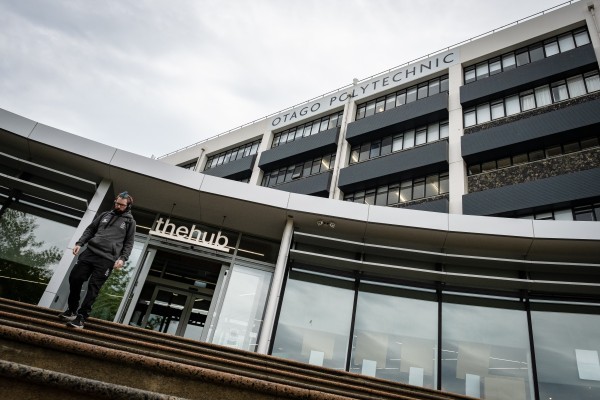On the 26th of September, the Otago Polytech advised kaimahi, ākonga, the Otago Polytech Students Association, stakeholders, and the media (except for Critic – we found out through a student) of a proposal to move to a telehealth set up for their student health provision for the 2026 academic year.
Telehealth refers to delivery of health services digitally, rather than in person. The proposal is in response to the growing diversity within the Polytech’s learner population, a large percentage of which are distance learners. “[We] need to ensure we are operating sustainably and providing a timely and accessible health service for all our learners,” said Shaun Tāhau, Deputy Executive Director of Learner Experience and Partnerships.
Approximately one third of the Polytech’s ākonga are distance learners who are currently unable to access the in-house Student Health service at the Dunedin campus. The pressures of financial sustainability were also front-of-mind. “Unfortunately, our current model is not financially sustainable,” Shaun said in the media release.
The proposal is currently still in the consultation stage with kaimahi and ākonga. Approval would mean that the Polytech’s Student Health service would move to an online telehealth model provided by Pocket Lab, an online health service established by GPs. If the proposal goes ahead, current distance students would be given the choice of opting out of this service from January 2026. New distance students would pay for the service through their Student Services Fee.
Dave Goosselink, the Otago Polytech’s Senior Public Relations Communications Advisor, told Critic Te Ārohi that the proposal to shift to an online telehealth service is “aimed at providing learners with a broader range of healthcare services than [the Polytech] can currently offer” with their in-house services. Currently, the Polytech’s student health service is limited to weekdays from 8:30am - 5pm, with appointments available 9am - 4:30pm. Pocket Lab would allow ākonga to “quickly and easily” book same-day appointments themselves from anywhere in Aotearoa, between 8am and 10pm, 7 days a week, as opposed to calling ahead for an appointment.
The vast majority of Pocket Lab’s telehealth appointments are resolved fully online, with fewer than 2% of these appointments converting to a further in-person referral. The small number of learners who do need to be referred on for a physical appointment would go to the Urgent Doctors, where the Polytech currently refer learners when Student Health isn’t available.
One design student at the Polytech, Stella, could understand both sides of the decision. She said, “Going online would be super helpful for distance students.” However, from her personal experience, “There’s nothing like having a face to face check up with a professional whether – it’s Student Health or not.” Stella also noted her concerns about misdiagnosis being more “prevalent” if online care was the only offering.
The Pocket Lab telehealth model is already used by a number of other tertiary institutions across New Zealand, such as Unitech and NorthTec, who “rate the service highly in terms of access and experience,” Dave told Critic. The discontinuation of the Dunedin Campus’ in-house Student Health services would result in disestablishing 4.77 full-time equivalent staff. “We are ensuring kaimahi are offered continual support during this process,” Dave explained. Otago Polytech had initially explored opportunities to integrate their healthcare services with that of Otago University’s Student Health, but initial investigations found this integration would be “very complex”.
Pocket Lab also offers a variety of doctors from diverse specialties and backgrounds, which has the potential to improve services for the likes of our Māori, Pasifika, and diverse students. “The broader range of specialists would also strengthen [the Polytech’s] ability to uphold legal obligations around the Pastoral Care Code,” Dave added. Polytech leadership has met with the Student Health team and OPSA to explain the proposed changes and the process the Polytech will follow to seek feedback.
Otago Polytechnic Students’ Association (OPSA) Co-Vice President Lemon Hay commented to Critic Te Ārohi that the OPSA board has “mixed views” on the proposal. They acknowledged that the current Student Health system doesn't fully cater to distance learners, and is running at a “deficit” – a big issue presently due to the disestablishment of Te Pūkenga, a national network for all the country’s 25 polytechnics and industry training organisations. Pocket Lab would also allow the Polytech to “scale the service” based on student numbers, paying for healthcare in direct relation to enrollment numbers. But on the other hand, Lemon also expressed concern over more job redundancy, which would just add to the list of losses experienced by Polytechs recently.
Lemon noted it is currently “unclear” whether Otago Polytechnic would cover referral fees to in-person care if something cannot be resolved online or over the phone. Given telehealth services cannot provide real-time, in-person healthcare services (blood pressure, STI testing, vaccinations), OPSA were worried that this may end up either costing students more, or “clog up” Urgent Doctors with “non-urgent health needs”. Both Lemon and healthcare staff they’d spoken to still find the change “discouraging”, and left wondering how “in real life” health needs will be met, and if going online will create “barriers to services later down the road.” As it stands, the Otago Polytechnic has indicated that it will look to contract in nursing services for key campaign drives including immunisation and sexual health.
When approached by Critic, a University of Otago spokesperson said that while they cannot speak on Otago Polytech’s behalf, they confirmed that University Student Health would not be affected by the proposal. “There is no anticipated impact on the University’s Student Health Service as it only serves University of Otago students who are enrolled on the Dunedin campus and pay the Compulsory Student Services Fee,” said the spokesperson.






